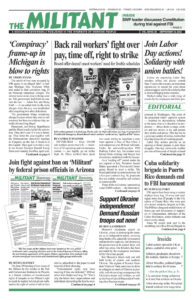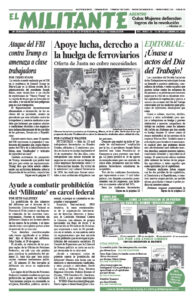September 15, 1997
A long list of railroad accidents has made national news over the last several months. In response, the U.S. Federal Railway Administration announced it would step up investigations, putting the CSX and Union Pacific under particular scrutiny. Why the rail industry is becoming increasingly unsafe, and what to do about it, is a growing discussion among rail workers and others.
From 1993 through 1996, UP had 28 derailments, collisions, or other accidents involving chemical spills or releases. CSX has had 14 more reportable accidents than it had for the comparable period last year.
Reflecting workers’ concern over safety, members of the Brotherhood of Locomotive Engineers demonstrated in Washington, D.C., April 28 to protest the rising number of deaths of rail workers and the intransigence on the part of the rail bosses to the safety question.
September 15, 1972
From the Mekong Delta in South Vietnam to the Chinese border of North Vietnam, 1,000 miles away, the U.S. is pounding the Vietnamese countryside.
President Nixon is exerting immense pressure on Hanoi. This includes not only the heaviest bombing in the history of warfare and the naval blockade of North Vietnam but also pressure on Hanoi achieved in the summit agreements with Moscow and Peking. Nevertheless, a settlement acceptable to Washington has not yet been achieved.
“Unless there is progress on the negotiating front,” Nixon stated Aug. 29, “I am not going to put any limitation on when the U. S. activities in the air would stop.” Their inability to crush the North Vietnamese revolutionary offensive in five months of ferocious warfare has led to U.S. bombing at its most intense level in the history of the war.
September 15, 1947
The spotlight in Great Britain remained on 140 miners at Grimethorpe, a colliery in Yorkshire. The miners were holding out in a wildcat strike that began Aug. 11. What gave this strike dynamic impact was the rank and file solidarity of miners in other pits. As many as 60,000 downed tools in sympathy.
The strike began when the bureaucrats heading the union agreed to a Coal Board decision to increase the daily “stint” of the miners from 21 feet of coal face to 23 feet. These miners had already had their “stint” increased to the maximum.
The widespread sympathy shows how dissatisfied the miners are with the Attlee government. All they have given the workers is a bureaucracy intent on carrying out the will of the British capitalist class. But the miners want the people to derive the benefits from Britain’s coal resources.

